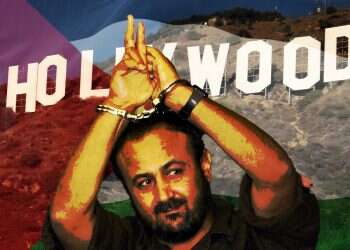At first glance, Sunday's riots on the Temple Mount fit nicely into the media storyline that Israel's "extremist right-wing nationalist" government is undermining relations between the Jewish majority and the Arab minority. Yet the most notable element of those riots was how many Israeli Arab religious leaders rejected the Jerusalem Waqf's all-out effort to foment them. In mosque after mosque throughout Israel, imams preferred to send a message of peace, thereby underscoring the true story of the past few years – not a breakdown of Jewish-Arab relations, but growing Arab integration.
The Jerusalem Waqf, which runs the Al-Aqsa Mosque compound, isn't Israeli at all. It's jointly controlled by Jordan and the Palestinian Authority, and diligently disseminates both countries' anti-Israel incitement. Hence it is no surprise that anti-Israel riots periodically erupt there.
Follow Israel Hayom on Facebook and Twitter
On Sunday, it sought to exploit a calendrical anomaly: The Jewish fast of Tisha B'Av coincided with the Muslim holiday of Eid al-Adha (Feast of the Sacrifice). Since both holidays commemorate events that occurred on the Mount (the destruction of the First and Second Temples, in Jewish tradition; Abraham's sacrifice of Ishmael, in Muslim tradition), some members of both faiths like visiting the mount on that day. The Waqf, therefore, called a mass prayer rally at Al-Aqsa to prevent Jews from "defiling" it with their "filthy feet," as Palestinian Authority leader Mahmoud Abbas once famously said.
To ensure mass attendance, it took two unusual steps. First, it ordered all other Jerusalem mosques closed on Sunday so that Jerusalem Muslims who wanted to attend services on one of the holiest days of the Muslim year would have nowhere else to go. Second, it asked imams throughout Israel to spread the message to their congregants.
Below are some of the responses from imams, who were asked what they thought of this (as published in Haaretz):
"Gathering in a religious space is not meant to cause escalation, much the opposite, we stress that we all must live in peace," said Sheikh Mohammad al-Quran, imam of Kseifa's mosque, adding that sermons and prayers at his mosque would focus on alms to the needy and the growing problem of violence within the Arab community.
Ahmad Abdullah, imam of Ein Naqquba's mosque, said that Friday's prayers were mainly a spiritual preparation for Saturday's fast, which precedes Sunday's holiday. "The topics brought up in the mosque are at the discretion of the imam," he added.
Sheikh Amar Walid, imam of Kafr Qassem's mosque, said that Eid al-Adha is meant to foster unity among peoples and deter violence and that violence within the Arab community would top his agenda that Friday, as it does every Friday. Then, referring to last week's murder of a 19-year-old Jewish yeshiva student by Palestinians, he added, "We are tired of the conflict, we need to end it already, the idea behind slaughtering an animal for the Feast of the Sacrifice is that it is upon us to avoid bloodshed among people."
In sharp contrast to how Israeli Arabs self-identified a decade ago, they now increasingly identify as Israeli
Nor are these imams unusual; most Israeli Arabs shun violence. Indeed, just last month, defense officials reported that terrorist activity among Israeli Arabs – never high to begin with – has dropped sharply, with the worrying exception of the Bedouin community, where it's on the rise.
In 2015, Israel arrested 120 Israeli Arabs suspected of terrorist activity. By 2018, that number had halved to just 60 arrests.
No less significant, Israeli Arabs increasingly identify as Israeli. In one survey conducted shortly before Israel's April election – nine months after the passage of the controversial nation-state law, which critics wrongly claimed made Arabs second-class citizens – 46% of respondents self-identified as "Israeli Arab," 22% as "Arab," 19% as "Israeli Palestinian" and 14% as "Palestinian." Thus 65% included "Israeli" in their self-definition, almost double the 33% who included "Palestinian." And the most integrationist option, "Israeli Arab," was chosen by more than twice as many people as the second-place contender. This is a sharp contrast to how Israeli Arabs self-identified a decade ago.
The same survey found that 76% of Israeli Arabs termed Jewish-Arab relations in daily life "mostly positive," while just 18% termed them negative. Moreover, fully 94% recognized the existence of a Jewish people, unlike the Palestinian Authority, which vehemently denies Jewish peoplehood. And in a separate poll, a majority of Arab respondents said they were "proud to be Israeli."
Equally notable is the recent change in Arab voting patterns. In April's election, 30% of Arab voters cast ballots for Jewish parties, almost double the 17% who did so in 2015. Granted, this was partly to protest the petty bickering that led Arab parties to dismantle their joint ticket; now that the Joint List has reconstituted itself, many Arab voters may return to it in September's do-over election. But some experts think the movement toward Jewish parties could actually intensify, and so do the parties themselves: Left-leaning parties are courting Arab voters in a manner that Thabet Abu Rass, co-director of the Abraham Initiatives coexistence organization, termed "unprecedented."
"The Center-Left Zionist parties are basically going over the heads of the Arab parties to appeal directly to Arab voters in a very genuine manner," he said, "and that is because they have identified the growing frustration of Arab voters with the parties that are meant to represent them."
Even more surprising, some center-rightists have urged their parties to do the same. Former Benjamin Netanyahu aide Nathan Eshel and Israel Hayom columnist Professor Eyal Zisser both recently published columns arguing that the time is ripe for this since repeated polls have shown that Arab voters overwhelmingly prioritize domestic issues – jobs, crime, education, and housing – over the Palestinian conflict. And successive Netanyahu governments have worked hard to address such issues in the Arab community.
None of this means there aren't real problems in Arab-Jewish relations, including unconscionable anti-Arab broadsides by too many rightist politicians and vicious anti-Israel incitement by Arab Knesset members and Islamist clerics. But overall, the story of the past decade – under Israel's "most right-wing government ever" – has been one of increasing Arab integration. Whatever government is formed after September's election must continue that trend.
Reprinted with permission from JNS.org.




